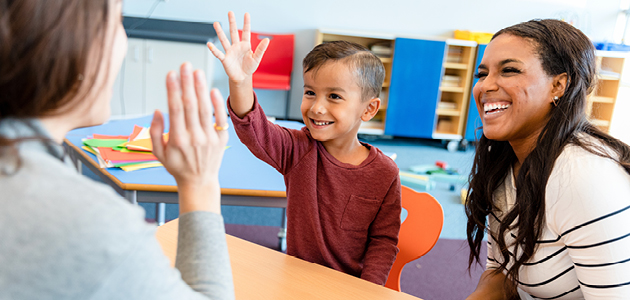Not wanting a long, fun summer to end is reason enough for some kids to dread the return to class, but for other children, it’s the notion of starting a new grade or a new school that makes those butterflies in the stomach really start fluttering. Still others may have some lingering COVID-19 concerns that are making them nervous about going back to class.
Regardless of the reason for anxious tummies and worried faces, there are ways to help prep your children for going back to school that may make the transition easier for everyone.
10 ways to ease the back-to-school transition
- Encourage your child to share their fears with you. Sometimes giving voice to those hidden concerns can make them seem more manageable, particularly since your child will know they are not coping with their fears all alone anymore.
- Help your child come up with coping strategies. After they have shared their fears, help your child problem solve and plan. Offering reassurance is good, but brainstorming ways to help your child cope gives them the power they need to feel they have control over difficult situations.
- Encourage your child to face their fears. Show them that avoiding a situation that makes them nervous isn’t the answer by making them go to school. Letting them stay home will reinforce their fears, making it increasingly more difficult to encourage them to attend in the future.
- Experience school before it starts. If you feel the situation warrants it, find out if you and your child can visit the school and meet their new teacher. Sometimes a little sneak preview can help calm some of the fears. This may be particularly helpful if your child is starting at a brand-new school.
- Talk about school in a positive way. Reminisce about the fun times you had as a student and talk about all the exciting things your child will get to see and experience this year.
- Focus on the positive aspects of a new class, grade, teacher or school. Maybe this year your child will get to go on a special field trip, learn how to play an instrument, or get to take part in a special school activity that they were too young for in the past. Point out all the exciting things to look forward to when they go to school.
- Get your child back into a regular sleeping/waking routine. Giving their bodies time to readjust to the stricter schedule will help make that part of going back to school a little easier to manage. A week or two before they go back to class, have your child go to bed and wake up on the schedule they’ll need to follow once school starts.
- Make the last week before school a little less busy and adventurous. Concentrate on quieter activities closer to home so the transition from summer “freedom” to school doesn’t seem quite as drastic. Picking out a new book to read, going for bike rides, or working on a summer scrapbook are fun ways to wind things down.
- Help your child feel as prepared as possible for the first day of school. Help them choose an outfit, buy new school supplies and make sure their bag is all packed and ready to go.
- Help them feel safe. If your child has ongoing worries about COVID-19, validate those feelings (it has been a very stressful time for children too, after all), but remind them that schools and teachers are doing everything they can to keep everyone as safe as possible. It can also be helpful to remind your child that they have the power to protect themselves by wearing a mask, practicing social distancing and washing their hands regularly.
School is really your child’s first full-time job, and it’s important to empower them to be able to confidently head off on that adventure and tackle the unknown. School fears usually ease within the first few days, so know that all the work you’re doing in advance should pay off soon.
For more great advice and strategies for helping children cope with back-to-school anxiety, visit Art As Therapy, and for information on how to help your child deal with pandemic-related anxiety, visit Children’s Hospital of Philadelphia.
420868 CAN/US (08/22)




